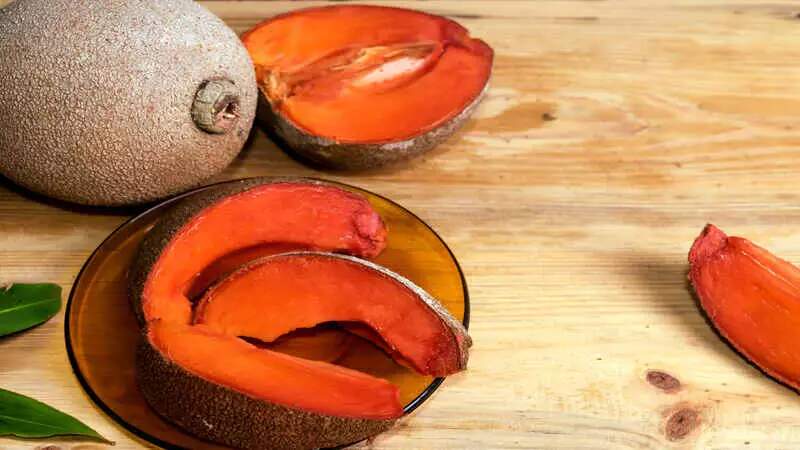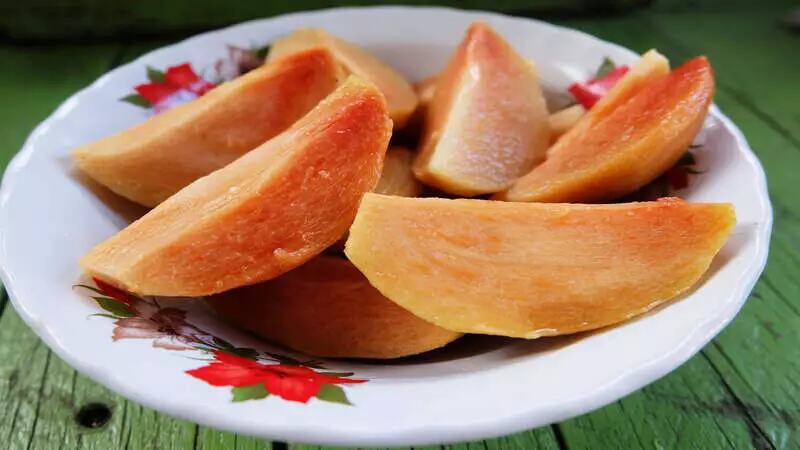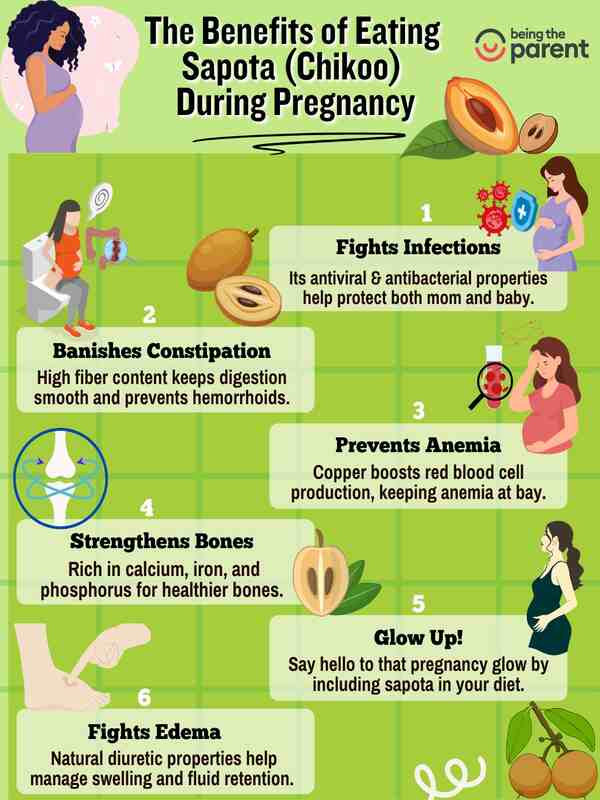
Pregnancy cravings can be tricky to manage, but one fruit that often stands out is sapota, also known as chikoo or sapodilla. If you’re asking yourself, “Can I eat chikoo in pregnancy?” or if you’re curious about the benefits of sapota during pregnancy, you’re in the right place! The good news is that sapodilla, commonly referred to as sapota or chikoo, is a nutritious and delicious option for expectant mothers. Loaded with essential vitamins, fiber, and antioxidants, sapodilla during pregnancy is a tasty and nourishing choice for both you and your unborn baby. Continue reading to discover the benefits of sapota in pregnancy. We will also discuss potential side effects and share valuable precautionary measures to ensure you maximize its health benefits safely.
What is Sapota Fruit?
Sapota, which is also known as Sapodilla or Chiku, is a common tropical fruit that is very delectable and sweet. It has a soft pulp, which is made with fructose as well as sucrose. This fruit is rich in calorie content and is loaded with many health benefits for skin, health, and hair (1).
The fruit is round and weighs about 150 grams. The pulp is soft and easy to digest and also has a sweet and crispy flavor (2). The presence of sucrose and fructose offers it a sweet taste that refreshes one instantly (3).
Nutritional Value of Sapota

The sapota fruit is enriched with many nutrients like vitamins, calcium, magnesium, phosphorus, carbohydrates, copper, flavonoids, vegetable proteins, iron, selenium, and zinc. All are key nutrients during pregnancy. This fruit also holds a significant amount of water (4).
Sapodilla in pregnancy is beneficial. It is low in fat content and has zero cholesterol as well. It even has niacin, riboflavin, thiamine, etc.
The table shows the nutritive value of Sapota (Chikoo) per 100gms (5)
| Constituents | Approximate value (per 100gms) |
| Water | 78% |
| Calories | 83 kcal |
| Protein | 0.4g |
| Fats | 1.1g |
| Carbohydrates | 20g |
| Dietary Fiber | 5.3g |
| Calcium | 21 mg |
| Iron | 0.8 mg |
| Phosphorus | 12.0 mg |
| Potassium | 193 mg |
| Sodium | 12 mg |
| Vitamin C | 14.7 mg |
Is It Safe To Eat Sapota During Pregnancy?

A common question among expectant mothers is, “Can I eat chikoo in pregnancy?”. Chikoo, also known as sapota, is completely safe to eat during pregnancy. It is high in vitamins, fiber, and antioxidants, supporting digestion and boosting immunity, both of which are crucial during pregnancy.
However, overeating sapota (chikoo) during pregnancy can lead to a few potential issues:
- Digestive Discomfort: Sapota is high in fiber, which, when consumed in excess, can cause bloating, gas, and even constipation. pregnancy itself takes a toll on digestion, and excessive consumption of sapota can aggravate it.
- Blood Sugar Spikes: While sapota is naturally sweet, overconsumption may cause an increase in blood sugar levels, which is a concern for pregnant women, especially those with gestational diabetes.
- Weight Gain: Because it is calorie-dense, eating too much sapota can contribute to unnecessary weight gain. Excessive weight gain during pregnancy can create complications.
As with any fruit, moderation is key. Always check with your doctor to ensure it fits into your pregnancy diet plan!
Note: Always consult your doctor for personalized advice before adding new foods to your pregnancy diet.
[Read: How Good Are Bananas For You During Pregnancy?]
Top 12 Health Benefits of Eating Sapota in Pregnancy
 Sapota during pregnancy helps in the overall growth and development of the body as it is enriched with nutrients. It is also soft and fleshy. It has an array of nutritional benefits that are good for the mother as well as the baby.
Sapota during pregnancy helps in the overall growth and development of the body as it is enriched with nutrients. It is also soft and fleshy. It has an array of nutritional benefits that are good for the mother as well as the baby.
Chikoo is loaded with vitamin A, carbohydrates, and energy. It is rich in protein and helps with the overall development of the fetus.
Some of the health benefits by the consumption of sapota during pregnancy are given as under:
1. Has Antiviral and Antibacterial Properties
Sapota has strong antiviral and antibacterial properties. It also has anti-parasitic properties. Therefore, it helps to prevent microbes from entering the body to some extent. It is good for fighting common infections during pregnancy (7).
2. Boosts Immunity
The vitamin C present in the fruit helps in building a stronger immune system, thus helping the pregnant mothers not to get affected by different diseases (8).
3. Combats Constipation
It has a rich fiber content that helps with constipation and hemorrhoid issues. Fibers also shield the outer membrane of the colon from carcinogenic toxins (9).
4. Anti-Diarrheal Property
Sapota is considered an anti-diarrheal due to its laxative properties. A concentrate prepared by boiling sapota in water can alleviate diarrhea (10). It also helps to relieve piles and dysentery.
5. Alleviate Nausea
The vitamin B present in the fruit helps to minimize nausea (11).
6. Prevents Anemia
Due to high copper content, eating sapota during pregnancy helps to produce red blood cells. It can thus help in the prevention of copper deficiency anemia. (12)
7. Boosts Energy
Sapota is a good source of glucose. Pregnancy is a phase when the energy drains out, and consumption of sapota helps in taking in carbohydrates that help with boosting the energy levels. Sapodilla is a high-calorie fruit (13). Each 100gm of sapota accounts for 83 Kcal.
8. Alleviates Pulmonary Issues
Consumption of Chiku helps to regulate blood sugar levels (15). Therefore, it is a healthy option for expecting mothers who contract gestational diabetes.
9. Good for Gestational Diabetes
Being rich in calcium, iron, and phosphorus, sapota fruit helps to strengthen the bones of expecting mothers. Maintaining bone density during pregnancy is important to bring down the risk of osteoporosis in the future (16).
10. Good for Bones
Sapota contains a significant amount of tannin, which is a strong anti-inflammatory agent (17). This anti-inflammatory property of sapota is highly beneficial to alleviate swelling and pains, which are quite common during pregnancy.
11. Reduces Swelling
The fruits and crushed seeds of sapota are known for their beneficial effects in managing oedema, thanks to their natural diuretic properties. By promoting increased urine production, they help to eliminate excess fluid from the body, which can reduce swelling. Additionally, sapota is beneficial in preventing the formation of kidney and bladder stones (18)
12. Healthy Skin
Vitamin E present in Sapota helps in nourishing the skin. It is very beneficial as pregnancy hormones can adversely affect the beauty of your skin. In short, getting a pregnancy glow will be easy if you include sapota in your diet.
Side Effects of Sapota During Pregnancy

“Can I eat chikoo in pregnancy?” is one of the frequent queries in forums. The sapota fruit has good nutritional value. However, if consumed in excess, it can lead to negative effects such as digestive issues, weight gain, and spikes in blood sugar levels. Some other possible side effects of sapota during pregnancy include:
- Some women may experience allergic reactions such as itching, swelling, or rashes after consuming sapota.
- Consumption of raw sapota can even result in ulcers, breathing issues, and throat irritation.
- The high sugar content may cause acid reflux or heartburn in some pregnant women.
- Sapota contains a good amount of potassium, and too much of it could lead to an imbalance in electrolytes, especially if you’re not balancing it with other foods.
- Due to its sweet taste, eating sapota during pregnancy might trigger cravings for more sugary foods, leading to an unhealthy diet.
[Read: Health Benefits Of Eating Apples During Pregnancy]
Precautions To Take While Eating Sapota During Pregnancy
Chikoo, when combined with other foods such as yogurt or nuts, improves the nutrition and taste. When consuming sapota during pregnancy, it is vital to observe specific precautions to ensure a safe and pleasant experience.
- Verify that the Sapotas are fully ripe. Unripe ones can be astringent and leave dryness in the mouth.
- Consume sapota in moderation since it is high in calories.
- Chikoo contains compounds that cause latex-related reactions.
- Always wash chikoos thoroughly to eliminate any potential contaminants.
- If you have any existing health issues or allergies, it is wise to consult a healthcare professional before adding chikoo.
How Much Amount of Sapota Can One Eat in a Day During Pregnancy?
Eating in moderation is essential for good health, both during pregnancy and at other times. It’s important to consult your healthcare provider about your diet plan, particularly while you are pregnant.
How to Select Sapota?
To maximize nutrition, it’s best to consume fresh fruits. For sapotas, also known as chikoo, you should only store them for a maximum of three to four days. If you prefer, you can buy slightly unripe sapotas and let them ripen before eating. When selecting the fruit, check that it has a smooth surface and feels soft when you press it.
Do not take the fruits that have broken skin or wrinkles. Store this fruit in a cool and dry place that is away from the sunlight. You can store Chikoo fruit at room temperature for a few days, but you can also store this in the refrigerator for up to a week.
Who Should Avoid Sapota During Pregnancy?
Expectant mothers should be cautious with their diet, especially regarding sapota (chikoo), which can pose health risks. Even the ones with sapota or latex allergies should avoid it, as reactions can affect both mother and fetus. Pregnant women with gestational diabetes and significant weight gain should restrict this fruit because it is a high-calorie fruit. Additionally, women with gastrointestinal issues may find Chikoo worsens their symptoms due to its high fiber content.
Eating sapota during pregnancy is safe. However, pregnant women must eat this fruit in moderation to avoid extra weight gain and gestational diabetes. Pregnant women should take their doctor’s advice before including Chikoo or Sapota in their pregnancy diet.
FAQ’s
1. Can I be Allergic to Sapota During Pregnancy?
Yes, you can. Allergy towards sapota is not uncommon. It can be due to pregnancy or it can also be hereditary.
2. Can Eating Chiku During Pregnancy Cause Gestational Diabetes?
This fruit is rich in fructose and is sweet in nature. If you are having high sugar levels, you may have to control the quantity of intake. Check with your doctor for quantity recommendations.
3. Can Eating Spota During Pregnancy Benefit My Baby?
Yes, it can. Sapota is rich in many nutrients such as thiamine, riboflavin, etc. these are very good for your baby too.
4. Can I Eat Sapota to Reduce Morning Sickness?
Yes, you can. Sapota is very nutritious for pregnant women. It is rich in electrolytes and other minerals which can restore your energy when you are suffering from morning sickness.
5. Is Sapota Safe During Pregnancy?
Sapota is a beneficial fruit for pregnant women. It aids digestion by alleviating stomach discomfort, combating fatigue from morning sickness, and supporting collagen production. However, it must be consumed in moderation to avoid excessive weight gain and gestational diabetes.
6. How Much Sapota Is Safe During Pregnancy?
The safe consumption of Sapota varies based on individual health factors. Pregnant women, however, are advised to consume 100-120 grams of Sapota (chikoo) daily to help alleviate fatigue from morning sickness. Do consult a healthcare provider about dietary choices during pregnancy.
Read Also: Mangoes During Pregnancy
References
-
- Yahia, Elhadi. (2014). Sapodilla and Related Fruits – https://www.researchgate.net/publication/241210488_Sapodilla_and_Related_Fruits
- CABI, Manilkara zapota (sapodilla) – https://www.cabidigitallibrary.org/doi/10.1079/cabicompendium.34560
- Development and antioxidant capacity of sapota pulp Jelly (Quararibea cordata Vischer) – https://www.scielo.br/j/cagro/a/mJJXdhBLXbdQhKL4d5mMSLz/
- Shipra Chaudhary and Rajeev Kumar. 2020. Sapota Fruit Attributed Health Benefits and Its Food Applications: A Review.Int.J.Curr.Res.Aca.Rev. 8(5): 124-128 – http://www.ijcrar.com/abstractview.php?ID=683&vol=8-5-2020&SNo=13
- USDA, Sapodilla, raw –https://fdc.nal.usda.gov/food-details/167759/nutrients
- Institute of Medicine (US) Committee on Nutritional Status During Pregnancy and Lactation. Nutrition During Lactation. Washington (DC): National Academies Press (US); 1991. 9, Meeting Maternal Nutrient Needs During Lactation. – https://www.ncbi.nlm.nih.gov/books/NBK235579/
- Riaz MB, Khan AU, Qazi NG. Pharmacological and computational evaluation of Sapodilla and its constituents for therapeutic potential in hyperactive gastrointestinal disorders. Iran J Basic Med Sci. 2020 Feb;23 – https://pmc.ncbi.nlm.nih.gov/articles/PMC7211360/
- Total serum vitamin C concentration in pregnant women: implications for a healthy pregnancy – https://www.scielo.br/j/rbsmi/a/FRJ5NQj9ynY5q6KNRGhbGbB/?lang=en
- Celiberto F, Aloisio A, Girardi B, Pricci M, Iannone A, Russo F, Riezzo G, D’Attoma B, Ierardi E, Losurdo G, Di Leo A. Fibres and Colorectal Cancer: Clinical and Molecular Evidence. Int J Mol Sci. 2023 Aug 31 – https://pmc.ncbi.nlm.nih.gov/articles/PMC10488173/
- Ansari SF, Khan AU, Qazi NG, Shah FA, Naeem K. In Vivo, Proteomic, and In Silico Investigation of Sapodilla for Therapeutic Potential in Gastrointestinal Disorders. Biomed Res Int. 2019 Dec 10 – https://pmc.ncbi.nlm.nih.gov/articles/PMC6925776/
- NIH, Vitamin B6 – https://ods.od.nih.gov/factsheets/VitaminB6-HealthProfessional/
- Grzeszczak K, Kwiatkowski S, Kosik-Bogacka D. The Role of Fe, Zn, and Cu in Pregnancy. Biomolecules. 2020 Aug – https://pmc.ncbi.nlm.nih.gov/articles/PMC7463674/
- Manilkara zapota “chicozapote” as a fruit source of health-beneficial bioactive compounds and its effects on chronic degenerative and infectious diseases, a review – https://www.frontiersin.org/journals/nutrition/articles/10.3389/fnut.2023.1194283/full
- Erebara A, Bozzo P, Einarson A, Koren G. Treating the common cold during pregnancy. Can Fam Physician. 2008 May – https://pmc.ncbi.nlm.nih.gov/articles/PMC2377219/
- Guevarra, M. T., & Panlasigui, L. N. (2000). Blood glucose responses of diabetes mellitus type II patients to some local fruits. Asia Pacific journal of clinical nutrition – https://pubmed.ncbi.nlm.nih.gov/24394507/
- Bone Mineral Density Changes Associated With Pregnancy, Lactation, and Medical Treatments in Premenopausal Women and Effects Later in Life – https://www.liebertpub.com/doi/full/10.1089/jwh.2020.8989
- Hamzah, Baharuddin & Rahmawati, Sitti & Suwena, Wayan & Hardani, Muhammad & Hardani, Ririen. (2020). ANALYSIS OF TANNIN IN SAPODILLA FRUIT (Manilkara zapota (L) VAN ROYEN). Rasayan Journal of Chemistry. 13. 2243-2248. 10.31788/RJC.2020.1345753. – https://www.researchgate.net/publication/347652880
- M. Baskar, G. Hemalatha and P. Muneeshwari, Department of Food Science and Nutrition, Community Science College and Research Institute, TNAU, Madurai-625 014, India – https://www.ijcmas.com/9-1-2020/M.%20Baskar%2C%20et%20al.pdf
